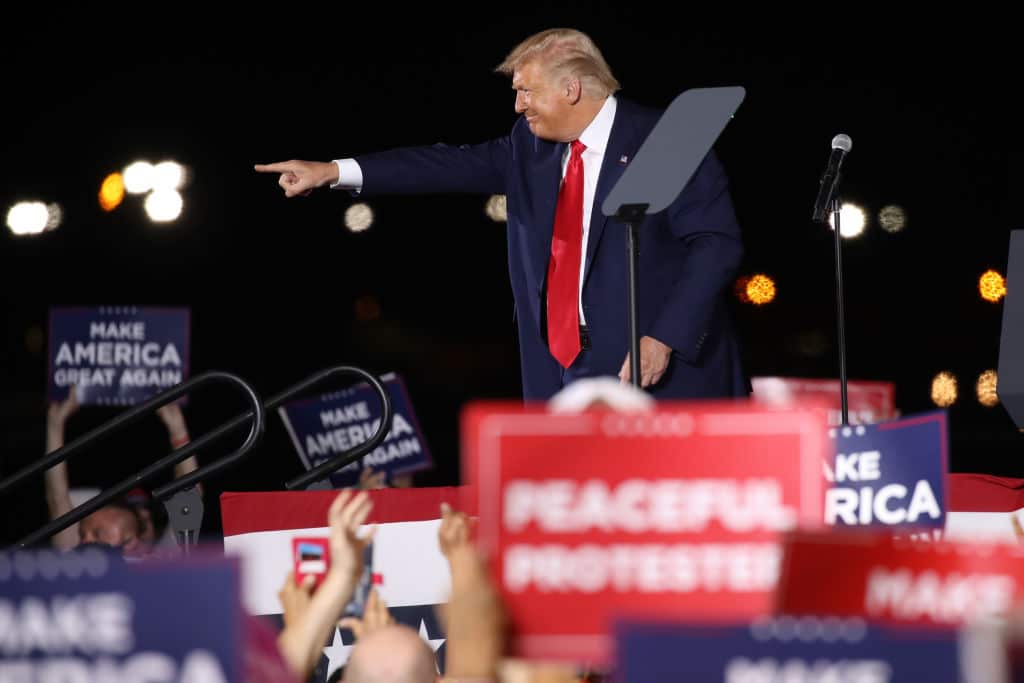 President Donald Trump speaks at an airport hanger at a rally a day after he formally accepted his party’s nomination at the Republican National Convention on August 28, 2020 in Londonderry, New Hampshire. (Photo by Spencer Platt/Getty Images)
President Donald Trump speaks at an airport hanger at a rally a day after he formally accepted his party’s nomination at the Republican National Convention on August 28, 2020 in Londonderry, New Hampshire. (Photo by Spencer Platt/Getty Images) The presidential campaign has shifted its focus from COVID-19 to crime. More accurately, this is the week President Donald Trump dragged criminal justice and law-and-order issues back to center stage. How Democratic nominee Joe Biden responds to this challenge could define the election’s outcome.
In the spring, the nationwide demonstrations that spread in the aftermath of George Floyd’s death while in police custody put Trump on the defensive, as the national conversation focused on questions of racial justice, and initial polling showed most Americans did not approve of the way their president was addressing these concerns. But as summer wore on and unrest continued in Portland, Seattle and other cities, those same polls showed Trump gradually gaining ground, then surpassing Biden on the question of which candidate would be more successful at subduing violent crime.
As the calendar now turns to fall, the police shooting of Jacob Blake in Kenosha,Wis., has greatly intensified the spotlight on these questions. The timing of the shooting and the subsequent protests enabled Trump to use his party’s convention to highlight his side of the argument for several days, with minimal pushback from Biden’s campaign.
But it’s now clear both candidates are engaging in this debate with all the force their respective camps can muster. Trump understands that public safety issues are the best remaining hope he has of winning back older voters and suburbanites who have moved away from him over the course of the coronavirus pandemic; and conflating peaceful protestors with rioters and looters would be the most effective way of convincing them to return. Biden has come to realize he cannot allow Trump to tie him to those responsible for the violence, and has begun to condemn the bloodshed more aggressively.
Biden will need to redirect the campaign dialogue back to COVID-19 and the economic and health devastation it has caused.
When the GOP convention opened, crime was barely a footnote on most voters’ list of concerns. At that time, Biden’s personal approval ratings not only were much higher than Trump’s, but well above Hillary Clinton’s numbers from the 2016 campaign. By the time the convention closed, Trump’s favorability largely was unchanged. However, Biden’s had begun to fall, most notably among independent voters. Trump was elected four years ago as the lesser-of-two-evils candidate, as he won the votes of those who disapproved of him and Clinton by a sizable margin. Biden is winning those “double-haters” now, but if voters continue to think less of him, Trump may have an opportunity to regain their support.
Biden’s challenge is twofold. The young progressives and voters from minority communities who are least enthusiastic about his campaign are exceedingly motivated by the need for police reform and racial justice. Even if Biden is successful at drawing the distinction between peaceful protestors and violent rioters, those voters will be very wary about anything he says that could be construed as overly pro-law enforcement. But it is a distinction he must draw, while establishing an equally stark divide between good cops and those who abuse their authority. Trump benefits when those lines are fuzzy; the pressure is on Biden to establish those boundaries as explicitly and unambiguously as possible.
More challenging for Biden will be his need to redirect the campaign dialogue back to COVID-19 and the economic and health devastation it has caused. If schools are not able to stay open this fall, if college football games are cancelled and movie theaters remain closed, it will be much more difficult for Trump to convince voters that their lives are returning to normal. But the president will continue to attempt to force the nation’s attention toward continuing unrest in Kenosha, Minneapolis and other cities, which could force Biden to spend much of the general election campaign on the defensive.
Biden’s challenge is not an easy one. He must simultaneously convince voters he is committed to racial justice, condemns violence, supports law enforcement and that while he cares deeply about all these issues, he believes none of them is as important as the pandemic and the economy.
That is as complicated a task as it sounds. Despite Biden’s lead in the polls, it’s becoming increasingly clear that the 2020 presidential decision is far from over.
Dan Schnur teaches political communications at UC Berkeley, USC and Pepperdine. He hosts the weekly webinar “Politics in the Time of Coronavirus” for the LA World Affairs Council Town Hall.” Find this week’s link here.





















 More news and opinions than at a Shabbat dinner, right in your inbox.
More news and opinions than at a Shabbat dinner, right in your inbox.